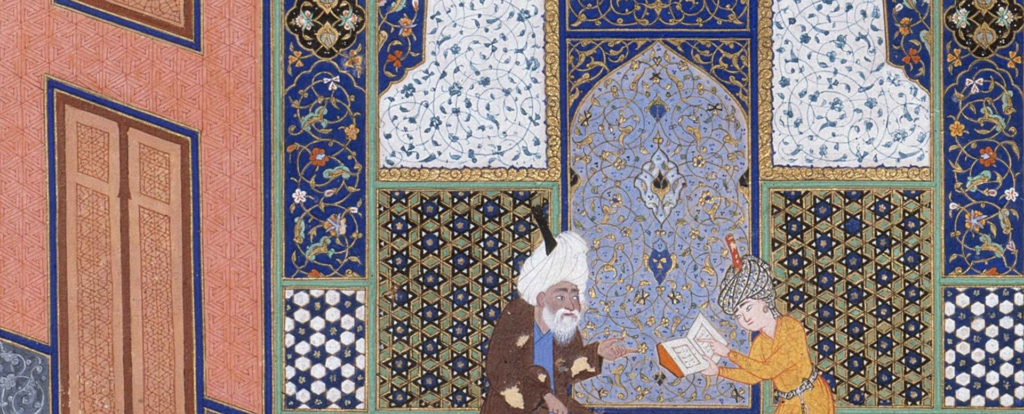This blog explores how certain poems, attributed to the medieval Persian poet Rumi (1207-1273), criticise religion and even replace it with secular norms and values based on reason. Such poems show a secularisation shift in Iran and in other Persian-speaking societies.

The tragic death of 22-year-old Mahsa Amini at the hands of the Islamic moral police on 22 September 2022 marks the start of protests against the Islamic Republic. During these protests, Iranians used many new slogans, including classical and modern Persian poetry, to convey their demands and to condemn the regime’s brutal performance. Discussions about the role of religion and whether religion and state (i.e., church and state) have been greatly intensified, not only at scholarly platforms but also on social media. These discussions are often fuelled through the publication of poems, the visual arts and videos, which are massively shared on social media. One of the central questions asked in such messages is how a religion can be the cause of so much violence, arrests and executions. In the first three months of the protests some 20,000 people were arrested and some 500 people killed, more than 60 of whom were children.
One of the poems that is recited on a video and hugely shared is attributed to Jalal al-Din Rumi (1207-1273), but the poem is certainly not by Rumi. The dissemination of this video is not limited to Iran, but also covers the situation in Afghanistan, where Persian-speaking Afghans have faced a great deal of violence from Taliban in recent decades. See f.e. the following video:
The poem that the man recites in this video problematises the concept of “religion” and what the role of religion is in society. Before analysing the poem, I will give a literal translation:

The Poem’s Message
This poem has different versions, but this is the most popular version on social media. At first glance, this poem shows similarities with many anecdotes recounted by Rumi, but on closer inspection it quickly becomes clear that many statements are not by Rumi. In several sayings in this poem we can see how the anonymous poet incorporates certain of Rumi’s popular ideas, such as religious tolerance, into his poem. There are also phrases similar to those we can encounter in Rumi’s poem. For example, the verse, “I am neither Muslim nor Christian nor Jew” is reminiscent of Rumi’s famous ghazal in which he says, “O Muslims! What should I do, for I don’t know who I am; I am neither a Christian, nor a Jew, nor a Zoroastrian, nor a Muslim.” The rest of this particular poem makes it clear that the issue is not that Rumi doubts his faith, but rather that he has transcended all religions and has achieved union with the divine beloved.
It is not clear why the above poem is attributed to Rumi. Probably because of the moderate religious views and for giving love and humanism a higher position than religion. One reason for attributing the poem to Rumi is that he enjoys great international prestige as a religious philosopher and a poet. His name legitimises the message of the text: when he says something, he is conveying a profound truth. The second reason is that such an attribution places the text in medieval times: it gives the impression that people have thought and spoken in this way for hundreds of years. Apart from legitimising the poem’s message, such an attribution to Rumi makes the poem timeless. The third reason is that these types of poems confirm how Persian-speaking people evaluate religion in the Islamic Republic of Iran. By sharing the poem on social media, people display their views and emotions about religiosity and irreligiosity. A person who chooses to share the poem hides behind Rumi, implying, “look! even Rumi made such statements seven hundred years ago!” The fourth reason is that Rumi is also known and appreciated in the West. So it links “the west” and the people who are rebelling against the Islamic regime. People in Islamic Iran do love people regardless of their religion. They are saying that they stand for the same deeply human values. As I indicated in my previous blog on Rumi (Rumi and the Hollywood Stars), he has become a source of inspiration for celebrities such as Madonna; Brad Pitt even tattooed a quote from Rumi on his arm.
Reason versus Religion
The emphasis of the poem by the anonymous poet is on reason. The poet uses the Persian term kherad, which means “reason” or “wisdom.” The term commonly appears in classical Persian poetry but is also associated with the “Book of Wisdom” (kherad-nama), a compilation of didactic, ethical and philosophical texts prescribing a practical and secular view on life. Here the emphasis is on correct action and proper behaviour. In this poem kherad is contrasted with religion. According to the poet, religion encourages people to kill fellow human beings, while kherad advises people to reflect on their own actions and the consequences. Instead of considering fellow human beings as enemies because of their religions, one should treat them with love. The word dusti comes from the Persian dust meaning “friend,” “beloved” and “dear.” The compound verb dusti-karden includes connotations of “to strike friendship,” “to treat people kindly,” but also “to love” in the classical context. As an answer to religious people, the anonymous poet is emphasising that it is not religion, but reason and humanism, that bring people to heaven. It is also noticeable here that the poet uses the Persian word minu for heaven or the spiritual world and not the Islamic concepts leading to heaven and the afterlife.
The question the son asks his father, “What is the best religion?” has become very topical in Iran in recent decades. People are searching for a way not only to have a decent life in this material existence but also to be assured of salvation in the afterlife. The father’s answer clearly shows that secularisation is underway. The father associates religion with violence. The poet utilises a simple Persian style throughout the poem, but his usage of the Arabic compound mahdur al-damm (“spilt of blood”) stands out. The readers associate this with Islam. The father believes that religion is the reason why people shed blood, because it promises people a reward for their violent act. The father chooses reason as his guide because he cannot understand why a religion justifies slaying fellow human beings. This is certainly a simplified way of dealing with religion and attaching violent qualifications to it, but it is this very simplified definition that speak to a wide range of people. Such an outspoken poem does not go unanswered. There are a number of responses in classical poetic style on the internet, defining religion in a different way. These poets disagree with the way religion is associated with violence and try to give a different definition of religion. They also inform the readers that this poem is not composed by Rumi!
The above poem should be read as a popularised attempt in which religion has to make way for humanism. Religion’s traditional primary purpose of guiding people through a straight path to salvation has been replaced by benevolence, philanthropy and humanism in contemporary Persian culture. The poem is a good example of Rumi’s contemporary reception history. This history is a desideratum, especially as in recent decades he has become a symbol of a transcendent Islam in which human dignity transcends religious differences.
Promoting secularisation
This poem is not so special as Iran has a long history of intellectual freethinking movements, which members of our team study in our ERC-Advanced Grant Beyond Sharia. A significant portion of the Iranian population is non-religious. A secular trend in Iran started as early as in the nineteenth century, in which nationalist intellectuals such as Mirza Fath-Ali Akhundzadeh (1812-1878) and Mirza Aqa Khan Kermani (1854-1896) opposed Islam. In this period, Persian intellectuals were seeking the causes of Iran’s intellectual stagnation and why Iran was lagging behind European technological progress. These intellectuals blamed Islam and the Arabs for the decay of the ancient glory of the Persian Empire, considering the arrival of Islam as the reason for the decline of Persian culture. These intellectuals chose not to appreciate the overwhelming contribution of the Persians in the creation of a Islamic civilisation. They even tried to change the Persian-Arabic alphabet which was regarded as an impediment to literacy. The ideas of these secular intellectuals were later adopted by the Pahlavi dynasty (1925-1979), which chose the policy of secularising Persian culture. The effects of this secularisation are visible in the growing Iranian intellectual circles before the 1979 Revolution. Also after the Revolution, the number of the secular population increased dramatically, partly because of the regime’s Islamist ideology, exclusion, persecution, imprisonment and execution of religious and political dissidents. And partly because of the creation of educational institutions in remote villages in the country, which has helped to increase the high literacy rate, allowing females to participate at university education. Some 65% of university students are girls. Generally speaking, the university students see that religion and a theocratic ideology have failed to answer their sober demands and most basic human rights. According to Gamaan, a group of scientists who analyse attitudes towards politics, religion and language, a large number of the Iranian population is non-religious. The poem should be placed in this context: religion is replaced by ideals of humanism. The main purpose of religion that leads people along the straight path to salvation is increasingly shifted by a desire for humanistic values in contemporary Persian culture. As Rumi says, “it is much better to be of the same heart than of the same tongue.”
For a Dutch version of this blog click here.
© Asghar Seyed-Gohrab and the Beyond Sharia ERC Project, 2023. This project has received funding from the European Research Council (ERC) under the European Union’s Horizon 2020 research and innovation programme (Grant agreement No. 101020403). Any unlicensed use of this blog without written permission from the author and the Beyond Sharia ERC Project is prohibited. Any use of this blog should give full credit to Asghar Seyed-Gohrab and the Beyond Sharia ERC Project.

